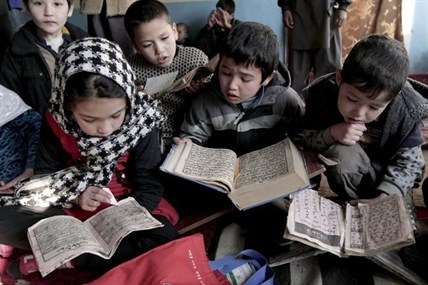
Afghan children learn to read the Quran, Islam's holy book, at a local Madrassa, or seminary, in Kabul, Afghanistan, Monday, Dec. 23, 2013. Canadian officials are shrugging off U.S. concerns that school enrolment numbers in Afghanistan ??? one of the most tangible indicators of the impact of millions in aid spending ??? may have been inflated or falsified outright.
Image Credit: THE CANADIAN PRESS/AP Photo/Rahmat Gul
July 05, 2015 - 8:00 PM
OTTAWA - Canadian officials are shrugging off U.S. concerns that school enrolment numbers in Afghanistan — one of the most tangible indicators of the impact of millions in aid spending — may have been inflated or falsified outright.
The American agency that oversees Afghan aid spending ordered a review of enrolment data after Afghanistan's education minister implied the numbers are misleading and that money may have been spent on so-called "ghost schools" that don't even exist.
"These allegations suggest that U.S. and other donors may have paid for schools that students do not attend and for the salaries of teachers who do not teach," John Sopko, the special inspector general for Afghanistan reconstruction, wrote in a letter to the United States Agency for International Development (USAID).
Canadian politicians and bureaucrats routinely cite a huge spike in enrolment as proof that at least $227 million in education spending in Afghanistan, including the construction of dozens of new schools, has made a difference.
When asked what Canada was doing to verify the statistics it uses, a spokesperson for Foreign Affairs initially said while they were aware Afghan officials sometimes inflate numbers in the media, Canada takes a different approach.
"(Foreign Affairs) is conservative when reporting Afghan school enrolment figures from 2013 which state that more than 8.4 million Afghan children, almost 39 per cent of whom are girls, are enrolled in formal and community-based schools," Francois Lasalle said in an email.
"This is a significant increase from only one million boys enrolled in formal schools in 2001."
Those figures, Lasalle said, were vetted and reported on by the Afghan Ministry of Education Management Information System.
Problem is, it was precisely those figures — and that information system — that were flagged by the American special inspector.
"USAID has cited a jump in students enrolled in schools — from an estimated 900,000 in 2002 to more than 8 million in 2013 — as a clear indicator of progress," wrote Sopko.
"The data USAID uses to measure this progress came from the MOE's Education Management Information System (EMIS), which USAID has said it cannot verify, and which it now appears that officials from the Karzai administration may have falsified."
In May, Afghan media reported that Minister of Education Asadullah Haneef Bakhi told parliament the government of former president Hamid Karzai made up education data to get more money from the international community.
After Sopko's concerns were made public, Bakhi reiterated some of his own.
"In some of the insecure areas, there are no schools, but the benefits, opportunities, money for infrastructure, money for teachers and so on have taken place," he told TOLOnews, according to an English translation of the interview that appears on the channel's website.
When asked to explain why Canada wasn't worried about the veracity of the same data, Foreign Affairs took a different approach.
In a follow up email, a different spokesperson said Canada seeks to validate the data it gets from Afghanistan via the World Bank, which oversees some of the largest education-oriented programs.
Their latest figures state 7.6 million children were in primary school in 2010.
"Nevertheless, given the conflict, basic insecurity, and rugged terrain it is difficult for all parties involved to fully confirm these figures," spokesperson Diana Khaddaj writes.
In its response to Sopko this week, USAID said it believed Bakhi's words were misinterpreted and he was not alleging actual fraud, just bad data collection, as well as a tendency by the former government to publicly overstate known enrolment.
They said there is no hard evidence of corruption or fraud.
News from © The Canadian Press, 2015